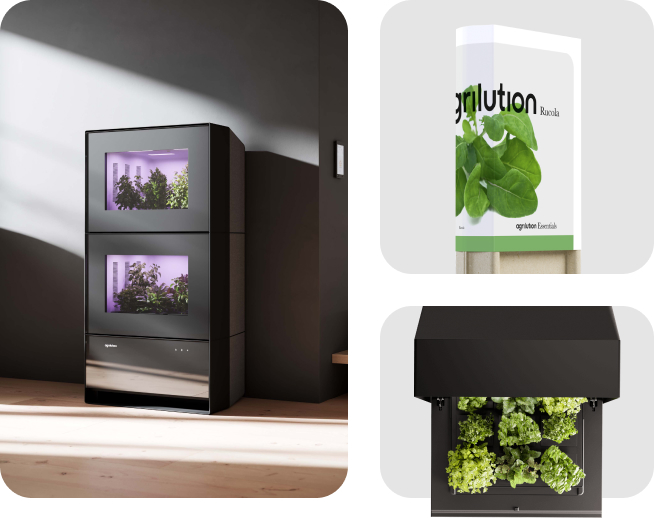Vertical farming – experience the megatrend
Vertical Farming – a particularly space-saving and efficient way of growing plants – is becoming the next megatrend in the field of nutrition. And Miele with its Agrilution subsidiary is directly involved in this mega-trend. With its solutions, the company is introducing its smart mini vertical farms to private households, and thereby helping to shape the future of food. This is a concept which was on show as one of the trend issues in numerous pavilions at the Expo 2020 in Dubai.
If Maximilian Loessl, CEO from Agrilution, were to have his own way, the future of food supply would be within the four walls of consumers’ homes and would be naturally integrated into every kitchen.
Extremely nutritious herbs, salads and micro-greens grow inside a small greenhouse, always exposed to the perfect conditions as far as light, water and climate go. At Miele’s Agrilution subsidiary, this vision of the future goes by the name Plantcube. A solution which, for Maximilian Loessl, symbolises nothing less than the next agricultural revolution. The Plantcube is controlled by an app which lets its user know when to add water or bring in the harvest. The Plantcube sees to the rest for the most part automatically.
What makes vertical farming so special?
To understand why vertical farming has recently become an important trend, it is worthwhile taking a look at conventional agriculture. Nowadays, farming is increasingly concentrated on a small number of large commercial operations. One of the results of this concentration is the distance travelled by produce before it reaches the consumer. This involves emissions in the process of transporting, warehousing and refrigerating food.
Thus, fresh products lose important nutrients on longer transport routes before they are even consumed. As a result of intensive forms of agriculture, the total area available for agricultural purposes is diminished each year to the tune of 30m acres (a little over 12m hectares). This amounts to the area needed to grow about 20m tonnes of wheat. At the same time, the soil loses important nutrients through intensive use.

“Vertical farming offers solutions to the most pressing problems posed by today’s modern agribusiness economy”, explains Maximilian Loessl. “Those who grow at least part of their food themselves help to stem this trend and reduce transport routes as well as packaging waste. And they can enjoy greens which contain up to 30 times more nutrients than their counterparts from the supermarket”. This is achieved, inter alia, through intelligent lighting systems, sensor-based climatic controls enabling plants to grow three times faster and automatic irrigation which saves more than 98% of water compared with conventional methods.
Agrilution goes one step further
Is it enough to simply offer a designer appliance for growing tasty herbs and micro-greens? That wouldn’t go anywhere near far enough for Loessl and his team at Agrilution. The 33-year-old is working intensively on making his Plantcube and the entire company as sustainable as possible.
Hence, Plantcube are designed to subscribe to the principles of a circular economy. None of the components feature adhesive bonds or the use of foam. Consequently, when the unit reaches the end of its useful life, it can be separated into its individual parts for recycling.
Moreover, Agrilution, like Miele, is CO2-neutral on balance – all emissions are recorded by the company and every effort made to reduce them. The company compensates for unavoidable emissions, mitigating their effect through sundry projects.
Agrilution even goes one step further when it come to Scope 3 emissions: As the bulk of emissions occurs in the use of a product, the company offers its customers the option of sourcing green electricity from a partner company with cheaper rates.
A burning passion
In conversation with Maximilian Loessl, one soon realises that vertical farming is more than simply a business idea. And there are good reasons for this. His mother was a development aid worker when he was growing up in China. There, he experienced the stark contrast between technical gadgetry on the one hand and severe malnutrition on the other. This formative experience prompted him to study vertical farming in the Netherlands, albeit many years later.
“My vision is to create a perfect eco-system with which anyone can grow their own nutritious greens”, says Loessl. A vision he shares with the vertical farming expert Philipp Wagner, with whom he founded Agrilution in 2013. In the space of just a few years, the company has grown to employ a staff of over 60 and is today a wholly owned subsidiary of Miele.
Miele and Agrilution: A perfect match
Stefan Breit, Executive Director for Technology at Miele, has accompanied the collaboration with Agrilution from the outset. “I am delighted that Agrilution has been part of the Miele Group since 2019. With its strong focus on sustainability and innovative technologies, the company is an excellent match for us and supports us in our continued growth”, says Breit. “At the same time, I believe that both sides can still learn a lot from each other through mutual exchange in the area of sustainability. Agrilution is already doing well on the topic of emissions in the use phase and this is also an important topic at Miele.”

